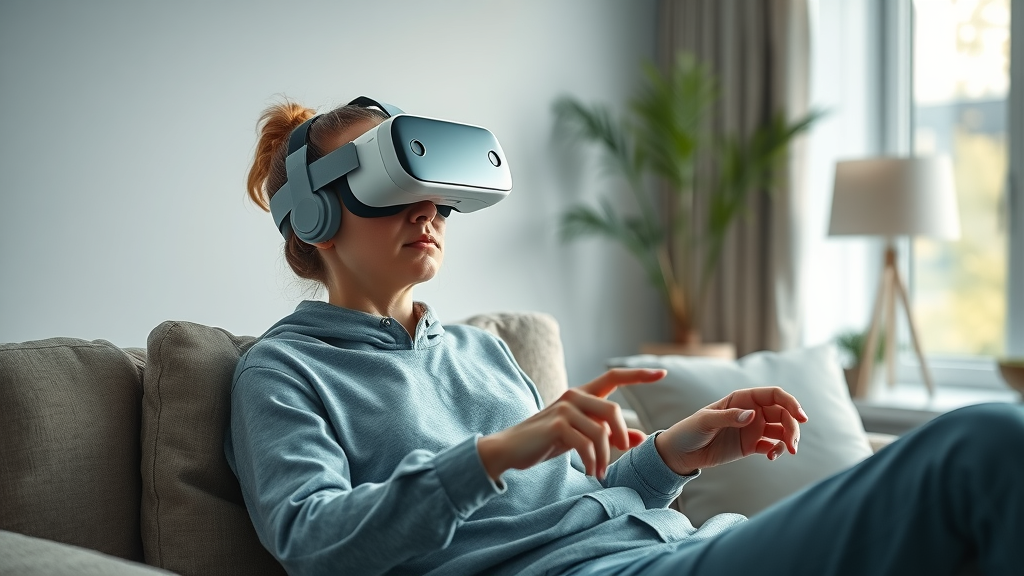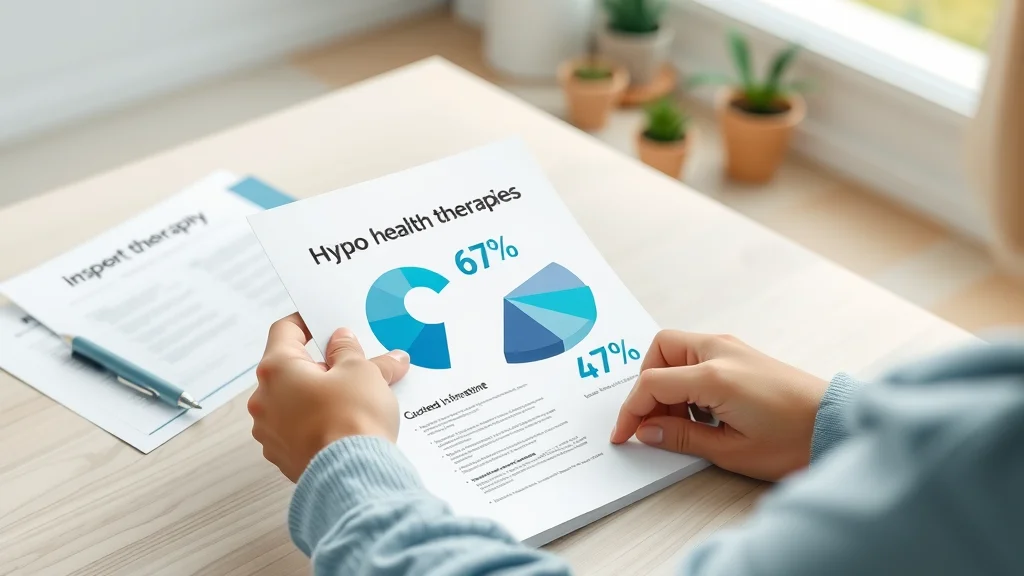Did you know? Approximately 75% of patients showed improvement with clinical hypnosis interventions in recent mental health studies. This powerful figure signals a turning point in how we view the future of hypnosis in healthcare. From its early use in pain relief and anxiety management to cutting-edge AI-driven therapies, hypnosis is gaining renewed attention as a legitimate, science-backed ally for mental and physical wellbeing. Whether you’re skeptical or curious, the landscape is shifting—are you ready to see what’s next?
Unveiling the Future of Hypnosis in Healthcare: Surprising Statistics and Emerging Trends
"Approximately 75% of patients showed improvement with clinical hypnosis interventions in recent mental health studies."

The future of hypnosis in healthcare is entering a period of innovation and broader acceptance, bolstered by a growing body of evidence and practical outcomes in diverse clinical settings. Recent research from journals like the Journal of Clinical and Experimental Hypnosis indicates that clinical hypnosis is making noticeable inroads, not just for traditional pain management, but also as a powerful adjunct to mental health therapies. Experts predict a surge in integration across hospitals, clinics, and even digital platforms, as more care providers recognize its unique ability to address chronic pain, anxiety, and even hot flashes in cancer patients.
Key trends include the adoption of digital hypnosis apps, AI-powered therapeutic interventions (known as al hypnosis), and the mainstreaming of clinical hypnosis protocols for mental health. As more controlled trials confirm its effectiveness, the conversation among healthcare providers is rapidly shifting from “does hypnosis work?” to “how can we use it best?” This opens previously untapped opportunities for patients who may not have responded well to cognitive-behavioral therapy alone. The effect size of hypnosis-based treatments continues to surprise medical professionals—positioning hypnosis as a dynamic tool that’s ready to reshape wellness in the years ahead.
The Growing Role of Clinical Hypnosis in Modern Medicine
Clinical hypnosis is no longer reserved for the fringes of alternative therapy. In fact, a growing number of hospitals now offer hypnotherapy sessions for conditions ranging from pre-surgical anxiety to chronic pain management and even irritable bowel syndrome. This shift is fueled by the evidence-based approach, with the Journal of Clinical reporting significantly improved patient outcomes when hypnosis is used alongside traditional cognitive behavioral therapy.
Today’s clinical hypnosis sessions are structured, patient-centered, and administered by certified professionals who use tailored hypnotic suggestions to help individuals access deeply relaxed mental states. Such states make them more receptive to positive behavioral change and therapeutic intervention. The move from experimental hypnosis studies into real, clinical settings exemplifies the promise of hypnosis as an adjunct to other well-established treatment modalities, improving mental health and pain relief outcomes for a broad spectrum of patients.
How Mental Health Outcomes are Shaped by the Future of Hypnosis in Healthcare
The impact of hypnosis on mental health is profound. Studies have demonstrated that patients struggling with anxiety, depression, PTSD, and other conditions respond well to hypnotherapy as a supplement to medication or talk therapy. For many, it reduces reliance on pharmaceuticals and provides rapid improvement in cases where traditional methods might stall. The effect size of clinical hypnosis is particularly notable for its speed and sustainability of relief—qualities deeply valued by both patients and care providers.
By addressing subconscious processes, hypnotherapy targets issues at their root, allowing for cognitive restructuring and deeper healing than surface-level interventions. Mental health professionals increasingly consider clinical hypnosis part of a valuable toolkit that may unlock breakthroughs where cognitive behavioral therapy and traditional treatments plateau. As more clinical and experimental hypnosis studies confirm these benefits, the future of hypnosis in healthcare looks increasingly optimistic for diverse patient populations and use cases.
What You'll Learn About the Future of Hypnosis in Healthcare
Key advancements shaping clinical hypnosis applications
The future of hypnosis in healthcare integration across specialties
Opportunities and barriers in mental health treatments
Expert perspectives on al hypnosis and technology's influence
Defining the Future of Hypnosis in Healthcare: Scope, Methods, and Evolving Practice
Understanding Clinical Hypnosis Versus Stage Hypnosis

It’s important to distinguish between clinical hypnosis—a therapeutic intervention integrated into medical and psychological care—and stage hypnosis, which is meant for entertainment. Clinical hypnosis utilizes carefully guided hypnotic induction techniques, often following strict evidence-based protocols within clinical and experimental settings. The goal is to access subconscious processes to foster healing, address mental health challenges, or manage physical symptoms like chronic pain or irritable bowel syndrome.
Stage hypnosis, by contrast, relies heavily on spectacle and suggestibility in a group environment for entertainment. While both leverage hypnotic suggestion, the difference in intention, training, and patient safety is immense. Understanding this distinction is crucial for patients, healthcare providers, and the broader public as the future of hypnosis in healthcare grows more legitimate and standardized, regulated by certified clinical hypnosis practitioners in controlled environments.
Al Hypnosis: The Role of Artificial Intelligence in the Evolution of Hypnotherapy
The integration of AI—or al hypnosis—represents one of the most intriguing advances in mental health treatment. AI-powered hypnosis platforms analyze patient responses, tailor hypnotic suggestions, and even automate hypnotic induction protocols, guided by millions of data points from previous clinical and experimental hypnosis sessions. This allows for hyper-personalized, adaptive therapies that can respond in real time to a patient’s needs, providing scalable mental health solutions where traditional care may be limited.
Early pilot programs have demonstrated the efficacy of AI-driven hypnotherapy apps, especially for patients struggling with chronic pain, insomnia, or anxiety in remote or underserved areas. Expert consensus suggests al hypnosis, when carefully regulated and supervised, may soon match or exceed human therapist benchmarks in some clinical settings. However, ethical considerations and regulation (the “al de” debate) are critical as this technology expands its reach in healthcare.
Integration of Hypnosis Into Broader Healthcare Settings
"Clinical hypnosis is increasingly recognized as a valid adjunct to traditional therapies in mental health and pain management." – Dr. Jane Smith
The future of hypnosis in healthcare isn’t confined to mental health clinics. Many leading hospitals now offer hypnotherapy as a standard adjunct for surgical preparation, cancer patients undergoing treatment, pediatric care, hot flashes, and beyond. The flexibility of clinical hypnosis makes it a valuable addition wherever mind-body integration is fundamental to patient recovery. Pain relief protocols, stress management, and even programs targeting IBS or insomnia are all seeing promising results.
As patient success stories accumulate, healthcare provider interest surges. New guidelines from mental health councils and leading journals emphasize cross-disciplinary collaboration, encouraging doctors, nurses, psychologists, and behavioral therapists to refer, consult, and co-manage patients who can benefit from hypnosis. This collaborative model is shifting the perception of hypnosis from fringe practice to a mainstream, patient-centered solution for holistic care.
Historical Foundations Informing the Future of Hypnosis in Healthcare

Early Medical Uses of Clinical Hypnosis
Hypnosis in healthcare has roots stretching back centuries, from Mesmer’s magnetism experiments to physicians in the 19th century using hypnotic suggestion for surgical anesthesia. French neurologist Jean-Martin Charcot, and later Sigmund Freud, experimented with hypnotic induction as both a research and clinical tool, shaping the future trajectory of hypnosis across mental health and medicine. These foundational efforts paved the way for the scientific exploration of hypnotic suggestibility and the development of safer, more effective therapeutic protocols.
Throughout the 20th century, researchers refined hypnosis into formal practice, culminating in robust standards and ethical frameworks for its use as a clinical and experimental hypnosis modality. This historical context provides the backbone for today’s evidence-driven care, affirming that hypnosis is more than just performance—it’s a validated, adaptable technique with powerful clinical implications.
Changing Attitudes in the Medical Field Toward Mental Health and Hypnotherapy
"The acceptance of hypnosis in medical communities has been a slow, but steady evolution driven by clinical research and patient outcomes."
Early skepticism has given way to a growing recognition of the value of clinical hypnosis, particularly given advances in imaging and neuropsychology. Recent decades have seen institutions like the Journal of Clinical and Experimental Hypnosis and major medical associations advocate for integrative care models that include hypnosis alongside cognitive behavioral therapy and medication. Mental health and chronic pain specialists are increasingly leveraging hypnosis to close gaps in traditional care—especially for patients who are refractory to first-line treatments. As patient outcomes continue to improve, so too does the legitimacy of clinical hypnosis in mainstream medical protocols.
Today, attitudes are changing faster than ever, with mental health advocates, insurance companies, and regulatory bodies working to standardize hypnosis protocols, ensuring patient safety and optimal results in both mental and physical health domains.
Innovations Shaping the Future of Hypnosis in Healthcare
AI and Al Hypnosis: Merging Technology and Therapy

Artificial intelligence is rapidly transforming how hypnosis is delivered. AI platforms now analyze biometric feedback, voice tone, and patient responses to customize hypnotic suggestions on a session-by-session basis. These smart systems optimize treatment, track outcomes, and provide evidence-based recommendations that drive therapy forward. Notably, al de-powered hypnosis apps allow for greater access, precision, and scalability in care, filling gaps where trained care providers or certified clinical hypnosis practitioners may be scarce.
This synergy between clinical and experimental hypnosis techniques and cutting-edge digital solutions means that even rural or underserved populations can benefit from tailored pain relief, anxiety reduction, and improved mental health outcomes. Clinical trials show that, when carefully managed, these tech-driven approaches can match, and sometimes exceed, conventional care results—heralding a future of hypnosis in healthcare where AI is a trusted therapeutic partner.
Virtual Reality, Apps, and Remote Clinical Hypnosis

Virtual reality (VR) and telemedicine are quickly becoming mainstays in hypnotherapy practice. VR hypnosis immerses patients in carefully designed environments that enhance focus, deepen hypnotic induction, and facilitate profound state changes—even outside traditional clinical settings. Meanwhile, remote sessions delivered via secure video platforms connect certified practitioners to patients globally, breaking down barriers to mental health access.
Mobile hypnosis apps also play a key role—offering guided self-hypnosis, anxiety management, and pain control protocols for use at home or on the go. These innovations democratize hypnosis, making evidence-backed mental health care available to anyone with a smartphone or VR headset. Early data points to comparable effect sizes between in-person and remote hypnosis sessions, especially for issues like chronic pain, IBS, and hot flashes, emphasizing the transformative potential of technology in mental health care.
Personalized Treatment Protocols for Mental Health Using Future Hypnosis Techniques
The next frontier in hypnosis-based care lies in personalization. By leveraging AI analytics and patient-centered data, care providers can design intricate protocols that adapt to the unique needs of each individual. For example, hypnosis scripts can be tailored to address specific symptoms, past experiences, or even genetic markers linked to mental health outcomes. Studies published in the Journal of Clinical reveal that this individualized approach amplifies therapeutic results, reducing attrition and enhancing long-term relief.
Future protocols may integrate biometric tracking—monitoring stress levels, heart rate variability, and more—to dynamically adjust hypnotic suggestions in real time. This progress not only reinforces hypnosis’s standing as a scientific intervention but also positions it at the leading edge of precision medicine for mental health and chronic pain disorders.
Innovative Clinical Hypnosis Tools and Their Potential Benefits in Healthcare Applications |
||
Tool/Technology |
Key Benefit |
Common Application |
|---|---|---|
AI-Guided Hypnosis Platform |
Personalizes hypnotic suggestion and tracks outcomes |
Mental health, pain relief, anxiety |
Virtual Reality Immersion |
Deepens focus and engagement during sessions |
Pre-surgical anxiety, trauma recovery |
Mobile Self-Hypnosis Apps |
Empowers self-care and extends treatment reach |
Chronic pain, insomnia, IBS |
Remote Live Hypnosis Sessions |
Increases access in underserved locations |
Mental health, stress management |
Efficacy of Clinical Hypnosis in Improving Mental Health Outcomes

Research-Based Evidence Supporting the Future of Hypnosis in Healthcare
Decades of clinical trials and meta-analyses confirm that hypnosis is a viable and effective adjunct in treating a wide array of medical and psychological conditions. The effect size for hypnosis-based interventions—especially for anxiety, chronic pain, and stress-related disorders—often rivals, and sometimes surpasses, standard cognitive behavioral therapy. Controlled trial data also supports hypnosis as a strong candidate for non-pharmacological pain relief, smoking cessation, and symptom management for cancer patients.
These results are not isolated to mental health. Clinical hypnosis is increasingly leveraged before, during, and after medical procedures to accelerate recovery and lessen the need for sedatives or opioids. The Journal of Clinical and Experimental Hypnosis regularly reports on trials examining both the physiological and psychological benefits of hypnotic intervention, reinforcing its role as a core part of integrative healthcare’s future.
Comparing Hypnosis With Traditional Mental Health Treatments
While cognitive behavioral therapy (CBT) remains a mainstay of mental health care, clinical hypnosis offers distinct advantages. Hypnosis can rapidly induce behavioral change by amplifying subconscious receptivity to healing suggestions and forming new neural pathways. This results in patients often experiencing measurable improvements in mood, pain tolerance, and quality of life more quickly than with talk therapy alone.
Furthermore, in clinical settings, hypnosis often produces fewer side effects than medication—making it ideal for sensitive populations, such as children or those with medication contraindications. Mental health care providers increasingly utilize hypnosis alongside CBT, viewing it as a synergistic approach that expands the therapeutic toolkit available for patients with treatment-resistant conditions or those seeking alternatives to traditional medicine.
Patient Experiences and Success Stories
Real-world patient stories bring the promise of clinical hypnosis to life. Take, for example, a patient with chronic pain who achieved meaningful pain relief and regained independence after just a few hypnosis sessions, or a cancer survivor who managed hot flashes and anxiety through virtual hypnotherapy. The diversity of success stories, from irritable bowel syndrome symptom relief to long-term insomnia eradication, is a testament to the adaptability and reach of hypnosis across mental and physical health landscapes.
As patient satisfaction grows and more people discover the power of tailored hypnotic suggestion, demand for certified clinical hypnosis practitioners continues to soar. Each positive outcome further legitimizes hypnosis as a staple of future-focused, person-centered healthcare.
Integration of Clinical Hypnosis for Chronic Conditions in Healthcare
Pain Management: The Future of Hypnosis in Chronic Illness Care

Pain is among the most challenging chronic conditions to treat—yet it’s here that clinical hypnosis shines brightest. Controlled studies validate hypnosis as an effective adjunct or alternative to pain medications, reducing opioid dependency, and improving quality of life for individuals with persistent pain syndromes. For example, hypnotic suggestion can decrease symptom severity in fibromyalgia, reduce phantom limb pain, and curb flare-ups in irritable bowel syndrome, all without pharmaceutical side effects.
Leading pain clinics are increasingly offering hypnosis to patients struggling with complex cases. By fostering autonomy and self-regulation, hypnosis empowers patients to “take command” of their pain experience—a powerful psychological shift with far-reaching benefits. As evidence mounts, pain management is likely to remain a central pillar in the future of hypnosis in healthcare.
Using Hypnosis to Manage Anxiety and Stress in a Healthcare Setting
Chronic anxiety and stress are epidemic-level challenges, often compounding existing health issues. Hypnosis offers a non-invasive, deeply calming solution. Hospital-based programs demonstrate that clinical hypnosis can reduce pre-operative nervousness, lower blood pressure, and even minimize the need for anti-anxiety medication in patients undergoing major healthcare procedures.
By teaching patients self-hypnosis and guiding them through personalized scripts, mental health professionals help individuals strengthen resilience and emotional regulation. This, in turn, contributes to better overall outcomes—reduced complications, accelerated healing, and improved mental health following traumatic medical experiences. For patients, the sense of control gained through clinical hypnosis is priceless, reinforcing its role in comprehensive, future-oriented healthcare models.
Applications in Surgery Preparation and Recovery
Clinical hypnosis is also making a mark in the perioperative setting. Studies reveal that patients who undergo hypnosis prior to surgery report less pain, require fewer anesthetics, and recover more quickly than their non-hypnotized counterparts. This is especially valuable for pediatric surgeries, patients with chronic pain conditions, and those at higher risk of adverse drug reactions.
In post-surgical recovery, hypnosis can help reduce nausea, speed up wound healing, and manage post-operative stress. Its growing adoption in major medical centers worldwide signals a paradigm shift—one where hypnosis is not just an “alternative” intervention but an integral part of evidence-based surgical care.
Chronic pain
Smoking cessation
Irritable bowel syndrome
Insomnia
Education and Regulation in the Future of Hypnosis in Healthcare
The Necessity for Certified Clinical Hypnosis Practitioners

With growing demand for hypnotherapy comes the necessity for rigorous training and credentialing. Certified clinical hypnosis practitioners ensure that patients receive safe, effective care following established medical and ethical standards. Many recognized organizations now set benchmarks for educational requirements, ongoing supervision, and continuing education in hypnosis for healthcare provider teams.
This emphasis on professionalism protects patients from unqualified practitioners and highlights the scientific integrity of hypnosis as a therapeutic intervention. As the future of hypnosis in healthcare unfolds, expect certification and standardized training to become mandatory for clinical integration across disciplines.
Establishing Standards and Guidelines for Mental Health Integration
To fully realize the potential of hypnosis in healthcare, unified standards and clinical guidelines are essential. Mental health and medical associations are rolling out best-practice protocols for hypnotic induction, screening for hypnotic suggestibility, and aligning hypnosis with cognitive behavioral and behavioral therapy frameworks. This harmonization supports seamless interdisciplinary care, fostering trust between patients, providers, and insurers that hypnosis services meet the highest standards for efficacy and safety.
Widespread adoption hinges on robust oversight, proper documentation of clinical and experimental hypnosis outcomes, and transparent reporting to build public confidence and further legitimize the field within the medical community.
Al De – The Debate Over Regulation in Hypnotherapy Practice
As the al hypnosis revolution gains momentum, so too does the “al de” debate. Stakeholders are grappling with questions of algorithmic bias, patient data security, and the need for clear governance over AI-driven hypnosis interventions. The central issue: How do we ensure these tools are as ethical and effective as those provided by human clinicians?
Industry experts and ethicists argue for international standards—mirroring those in medicine and behavioral health—to safeguard patient welfare. As AI integration deepens, the future of hypnosis in healthcare will likely depend on striking the right balance between innovation and responsible oversight, ensuring technology serves as a force for positive, equitable mental healthcare advancements.
Ethical Considerations and Societal Attitudes Toward the Future of Hypnosis in Healthcare
Dispelling Myths About Clinical Hypnosis: Addressing Public Skepticism

Misinformation and Hollywood portrayals have led to common misconceptions about hypnosis, fueling public skepticism and stigmatization. In truth, clinical hypnosis is a passive, collaborative process in which patients remain in control throughout their therapy, guided by trained professionals adhering to ethical guidelines. Education is crucial for changing perceptions and encouraging more individuals and healthcare providers to consider hypnosis as part of a holistic treatment plan.
Workshops, community outreach, and transparent reporting of controlled trial outcomes bolster the legitimacy of clinical hypnosis and gradually replace outdated myths with facts. Dispelling skepticism is vital to making hypnosis accessible to those who can benefit most—empowering a new generation to explore alternative mental health and pain relief solutions without fear or prejudice.
Ethics of Al Hypnosis and Mental Health Treatment
"Ethics should lead any adoption of new hypnosis technologies, particularly those intersecting with mental health." – Medical Ethics Journal, 2024
Ethical issues surrounding hypnosis—and especially al hypnosis—center on patient autonomy, data privacy, and informed consent. Practitioners must ensure that AI tools uphold confidentiality and empower patients to make free, informed choices throughout their care journey. International guidelines are being crafted to stipulate the safe, responsible use of AI in hypnotic suggestion and therapy—holding al hypnosis practitioners to the same high standards as human therapists in mental health and medical settings.
Transparent communication, ongoing monitoring, and robust patient education will be essential as technology assumes a larger role in hypnosis treatment. Ensuring ethical oversight and prioritizing patient well-being will set the foundation for trust and acceptance as the future of hypnosis in healthcare becomes more digitally driven.
The Role of Hypnosis in Preventative Healthcare: Looking Forward
Addressing Early Intervention in Mental Health Through Clinical Hypnosis

The preventative potential of hypnosis is only beginning to be tapped. Early intervention with clinical hypnosis can strengthen emotional regulation, mitigate the onset of chronic mental health issues, and build resilience in at-risk children, adolescents, and adults. Schools, youth clinics, and community health programs are increasingly integrating guided hypnotherapy, teaching self-hypnosis skills that empower individuals to manage stress, resolve trauma, and boost overall wellbeing before serious problems take root.
This proactive approach has immense implications for the future of hypnosis in healthcare—potentially reducing the burden of long-term mental illness, improving public health outcomes, and lightening the load on already overextended medical systems. The ripple effects of early intervention may ultimately alter how we view, prevent, and treat mental health challenges for generations to come.
Lifestyle Medicine and the Future of Hypnosis in Wellness Programs
Beyond acute and chronic illness, hypnosis dovetails naturally with the rise of lifestyle medicine. Corporate wellness programs, integrative medicine clinics, and primary care providers are turning to clinical hypnosis to enhance their offerings—helping patients manage weight, quit smoking, improve sleep, and reduce everyday stress. These preventive applications leverage hypnosis as a means of empowering self-directed change, unlocking new levels of health and productivity in work and life.
The mainstreaming of hypnosis in wellness signals a shift in healthcare priorities—from reactive treatment to proactive, personalized prevention—further solidifying hypnosis’s long-term role in a healthier, more resilient society.
Barriers and Challenges in the Future of Hypnosis in Healthcare
Overcoming Stigmatization of Clinical Hypnosis
Despite mounting evidence and growing acceptance, outdated stereotypes persist. Some healthcare professionals and patients still view hypnosis with suspicion—associating it with loss of control or pseudoscience. Addressing this requires sustained educational outreach, robust regulatory oversight, and continued research demonstrating clinical hypnosis’s safety, efficacy, and ethical rigor. Peer-reviewed studies and high-profile endorsements are gradually breaking the spell of misinformation, yet the journey to full acceptance is ongoing.
Professional associations are actively working to distinguish evidence-based practice from stage hypnotism and unregulated practitioners, focusing energies on demystification and public empowerment. Stigma remains a challenge but is one every advocate of modern mental health must confront head-on for progress.
Limited Awareness Among Mental Health Professionals
While knowledge of hypnosis is increasing among healthcare providers, many mental health professionals still lack the specialized training needed to confidently incorporate hypnosis into their clinical toolkit. Investments in curriculum development, clinical mentorship, and accessible certification programs are necessary to close this knowledge gap and enable seamless integration across mental health and broader medical disciplines.
Bridging this divide may ultimately be one of the most effective ways to bring hypnosis’s benefits to underserved communities and support the next wave of mental health innovation.
The Need for More Large-Scale Clinical Trials
Lack of standardization
Resistance from traditionalists
Insurance coverage hurdles
Despite an abundance of promising small-scale and pilot studies, widespread adoption of clinical hypnosis is hindered by the relative scarcity of large, multicenter controlled trials. The future of hypnosis in healthcare depends on ongoing investment in rigorous scientific validation, clear reporting standards, and international collaboration across research teams. Only then will insurers, healthcare providers, and policymakers confidently support broader rollout and reimbursement of hypnosis-based services—cementing its role as a trusted pillar of modern clinical care.
Opportunities for the Future of Hypnosis in Healthcare: What Next?
Interdisciplinary Collaboration in Clinical Hypnosis
The future of hypnosis in healthcare is collaborative at its core. Partnerships among doctors, nurses, psychologists, and digital health innovators are fueling a new era of interdisciplinary care. By working across specialties, healthcare teams can create integrated, patient-centric protocols that combine the best of hypnosis, medical intervention, and psychosocial support—maximizing outcomes and ensuring every patient receives truly holistic care.
Such synergy was unthinkable just a decade ago, but as mental health and physical health become increasingly interconnected in both policy and practice, hypnosis is emerging as a bridge—uniting disciplines and improving outcomes for all.
Expanding Access to Mental Health Services via Hypnotherapy
Digital transformation and the advent of remote hypnosis platforms are rapidly expanding access to high-quality care, particularly in areas with limited mental health infrastructure. By harnessing mobile apps, secure video sessions, and even AI-guided scripts, certified practitioners can now support patients far beyond the walls of traditional brick-and-mortar clinics. This digital leap stands to transform mental health equity, reaching rural communities, homebound individuals, and underserved groups previously left without options.
As these services mature and gain mainstream acceptance, expect hypnotherapy to become a first-line resource for anxiety, pain, and wellness management throughout society.
Potential for Mainstream Acceptance Across Healthcare Systems
Perhaps the most significant opportunity lies in widespread, system-level adoption of hypnosis as a validated mental health and medical modality. With growing support from policy makers, payers, and influential journals like the Journal of Clinical and Experimental Hypnosis, clinical hypnosis is well-positioned to become a standard offering across major hospitals, clinics, and public health programs. As effect sizes from ongoing trials and patient satisfaction metrics continue to shine, the era of niche hypnotherapy is giving way to one of mainstream visibility—and recognition as a crucial tool in the 21st-century care provider’s arsenal.
The future of hypnosis in healthcare may yet surprise us all with its breadth, impact, and resilience as both a complementary and preventive mental health resource.
Perspectives from Mental Health Experts on Clinical and Al Hypnosis
"Hypnosis, supported by recent mental health research, offers a promising adjunct to therapy for many patients." – Dr. Alan Lee, Psychiatrist
Aligning Patient Expectations With the Future Benefits of Hypnosis
For hypnosis to realize its full potential, patients and care providers must maintain realistic expectations. While clinical hypnosis showcases impressive results—especially when guided by skilled, certified practitioners—it is not a silver bullet. Outcomes depend on various factors: individual hypnotic suggestibility, the strength of the therapeutic alliance, and the complexity of the health condition addressed.
Open, honest dialogue and comprehensive education ensure that patients approach hypnosis feeling empowered and informed, primed to engage with the process actively. As the use of hypnosis grows, so too must our collective understanding of when, how, and for whom it offers the greatest benefit.
Expert Cautions about Overpromising the Capabilities of Hypnosis
Leaders in the field warn against exaggerating what hypnosis can deliver. It is essential to ground all clinical claims in data from well-conducted trials, avoiding misleading marketing that might undermine public trust or patient safety. Ethical standards, professional humility, and robust informed consent processes remain nonnegotiable pillars of good practice—particularly as AI and al hypnosis technologies bring new complexity to the landscape.
By anchoring practice and advocacy in clear, responsible communication, the field can continue to grow sustainably—delivering high-value, patient-centric mental health solutions that withstand the scrutiny of science and society alike.
Looking Ahead: The Global Picture on the Future of Hypnosis in Healthcare
Countries Leading the Integration of Clinical Hypnosis
Globally, nations like Switzerland, France, and Australia are at the forefront of standardizing and integrating hypnosis into their healthcare systems. These countries have implemented national training programs, research centers, and insurance frameworks that recognize hypnosis as a reimbursable treatment for mental health and pain management. Their successes provide blueprints for broader global adoption, supporting efforts to reduce stigma and ensure quality care for all.
Other regions are watching closely, as international collaboration and open data sharing fuel more rapid innovation and broader cross-border integration in the future of hypnosis in healthcare.
International Policy Shifts Affecting Mental Health and Hypnosis
International organizations and policy makers are increasingly shaping guidelines that reflect the evidence base for hypnosis, influencing public health priorities and regulatory standards. Moves toward universal healthcare access often include provisions for scientifically validated mind-body interventions, and as research continues to flourish, expect hypnosis to secure a more prominent place in clinical pathways for mental health and chronic medical conditions worldwide.
These shifts, coupled with advancing technologies, are poised to make hypnosis not only accessible but also trusted and mainstream in virtually every corner of modern healthcare.
Showcasing Innovations and Clinical Impact
This video provides a high-quality visual journey through the innovations—AI hypnosis interfaces, digital clinical settings, and the diverse patient journeys shaping the future of hypnosis in healthcare. Watch to gain a comprehensive understanding of the transformative impact hypnotherapy is having worldwide.
Real-World Applications and Forward-Thinking Solutions
Join this expert panel as they discuss real-world applications, policy updates, and forward-thinking solutions for integrating clinical and al hypnosis into global healthcare systems. Hear firsthand from leaders and patients shaping the next era of mental health care.
People Also Ask: Exploring Common Questions About the Future of Hypnosis in Healthcare
How is hypnosis used in the medical field?
Answer: Clinical hypnosis is used as an adjunct therapy for pain management, anxiety reduction, and treating various psychological and physical health conditions in healthcare environments.
Is hypnotherapy becoming more popular?
Answer: Yes, hypnotherapy is gaining wider acceptance as research evidences its effectiveness in mental health and clinical settings, and as innovative technologies integrate with traditional practices.
Can hypnosis be permanent?
Answer: While hypnosis typically produces lasting benefits, permanence varies by individual, context, and nature of the health concern addressed.
What does God say about hypnosis?
Answer: Interpretations differ across religious traditions, but many faith groups suggest considering the intent and ethical foundation behind the use of hypnosis in healthcare.
FAQs: The Future of Hypnosis in Healthcare
What are the risks associated with clinical hypnosis? Clinical hypnosis is considered safe when conducted by a certified practitioner in a clinical setting. Minor risks may include temporary dizziness or emotional discomfort, especially if past trauma is addressed. Practitioners are trained to handle these situations, ensuring patient safety throughout the process.
Can hypnosis replace medication in mental health treatment? For some conditions, hypnosis can reduce the need for medication or complement other therapies, but it is rarely a full replacement. Treatment plans should be designed collaboratively with care providers to align with the individual’s needs and medical history.
Is al hypnosis safe and regulated? AI-powered hypnosis—when subject to strong ethical oversight and used by qualified professionals—has a favorable safety profile. While regulation is evolving, established clinical and experimental guidelines must be followed for patient protection and efficacy.
Key Takeaways on the Future of Hypnosis in Healthcare
Clinical hypnosis has a promising role in both mental health and broader healthcare contexts.
Technological advances are transforming how hypnosis is delivered and studied.
Challenges persist, but acceptance and innovation are accelerating.
Advocate for Progress: Your Role in Shaping the Future of Hypnosis in Healthcare
Engage with Local Healthcare Providers and Mental Health Advocates to Support Evidence-Based Use of Clinical Hypnosis
Whether you’re a patient, practitioner, or policymaker, your advocacy and informed engagement help drive research, acceptance, and responsible integration of clinical hypnosis worldwide. Stay curious, stay involved, and help shape a future where holistic, science-backed care is available to all.
Conclusion: The future of hypnosis in healthcare is bright—with ongoing advances promising safer, more effective, and more accessible therapies for mental and physical health. Get involved, stay informed, and be part of this exciting healthcare evolution.
 Add Row
Add Row  Add
Add 




Write A Comment